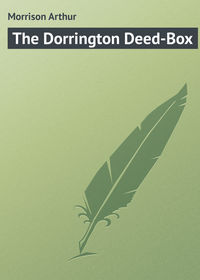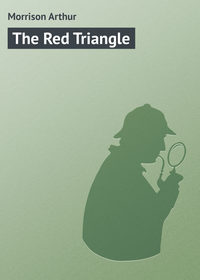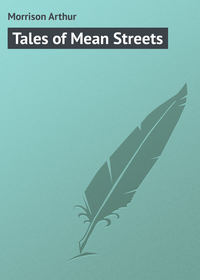 полная версия
полная версияA Child of the Jago
'When you find anythink,' he said, 'jist like you found that watch, don't tell nobody, an' don't let nobody see it. Bring it 'ere quiet, when there ain't any p'liceman in the street, an' come right through to the back o' the shop, an' say, "I come to clean the knives." Unnerstand? "I come to clean the knives." There ain't no knives to clean – it's on'y a way o' tellin' me you got somethink without other people knowin'. An' then I'll give you somethink for it – money p'raps, or p'raps cake or wot not. Don't forgit. "I come to clean the knives." See?'
Yes, Dicky understood perfectly; and Dicky saw a new world of dazzling delights. Cake – limitless cake, coffee, and the like whenever he might feel moved thereunto; but more than all, money – actual money. Good broad pennies, perhaps whole shillings – perhaps even more still: money to buy bullock's liver for dinner, or tripe, or what you fancied: saveloys, baked potatoes from the can on cold nights, a little cart to wheel Looey in, a boat from a toy-shop with sails!
'There's no end o' things to be found all over the place, an' a sharp boy like you can find 'em every day. If you don't find 'em, someone else will; there's plenty on 'em about on the look-out, an' you got jist as much right as them. On'y mind!' – Mr Weech was suddenly stern and serious, and his forefinger was raised impressively – 'you know you can't do anythink without I know, an' if you say a word – if you say a word,' his fist came on the table with a bang, 'somethink 'll happen to you. Somethink bad.'
Mr Weech rose, and was pleasant again, though business-like. 'Now, you just go an' find somethink,' he said. 'Look sharp about it, an' don't go an' git in trouble. The cawfy's a penny, an' the cake's a penny – ought prop'ly to be twopence, but say a penny this time. That's twopence you owe me, an' you better bring somethink an' pay it off quick. So go along.'
This was an unforeseen tag to the entertainment. For the first time in his life Dicky was in debt. It was a little disappointing to find the coffee and cake no gift after all: though, indeed, it now seemed foolish to have supposed they were; for in Dicky Perrott's world people did not give things away – that were the act of a fool. Thus Dicky, with his hands in his broken pockets, and thought in his small face, whereon still stood the muddy streaks of yesterday's tears, trudged out of Mr Aaron Weech's shop-door, and along Meakin Street.
Now he was beginning the world seriously, and must face the fact. Truly the world had been serious enough for him hitherto, but that he knew not. Now he was of an age when most boys were thieving for themselves, and he owed money like a man. True it was, as Mr Weech had said, that everybody – the whole Jago – was on the look-out for himself. Plainly he must take his share, lest it fall to others. As to the old gentleman's watch, he had but been beforehand. Through foolish ingenuousness he had lost it, and his father had got it, who could so much more easily steal one for himself; for he was a strong man, and had but to knock over another man at any night-time. Nobody should hear of future clicks but Mr Weech. Each for himself? Come, he must open his eyes.
VII
There was no chance all along Meakin Street. The chandlers and the keepers of cook-shops knew their neighbourhood too well to leave articles unguarded. Soon Dicky reached Shoreditch High Street. There things were a little more favourable. There were shops, as he well remembered, where goods were sometimes exhibited at the doors and outside the windows; but to-day there seemed to be no chance of the sort. As for the people, he was too short to try pockets, and indeed the High Street rarely gave passage to a more unpromising lot. Moreover, from robbery from the person he knew he must abstain, except for such uncommon opportunities as that of the Bishop's watch, for some years yet.
He hung about the doors and windows of shop after shop, hoping for a temporary absence of the shop-keeper, which might leave something snatchable. But he hoped in vain. From most shops he was driven away, for the Shoreditch trader is not slow to judge the purpose of a loitering boy. So he passed nearly two hours: when at last he saw his chance. It came in an advantageous part of High Street, not far from the 'Posties,' though on the opposite side of the way. A nurse-girl had left a perambulator at a shop door, while she bought inside, and on the perambulator lay loose a little skin rug, from under which a little fat leg stuck and waved aloft. Dicky set his back to the shop, and sidled to within reach of the perambulator. But it chanced that at this moment the nurse-girl stepped to the door, and she made a snatch at his arm as he lifted the rug. This he dropped at once, and was swinging leisurely away (for he despised the chase of any nurse-girl) when a man took him suddenly by the shoulder. Quick as a weasel, Dicky ducked under the man's arm, pulled his shoulder clear, dropped forward and rested an instant on the tips of his fingers to avoid the catch of the other hand, and shot out into the road. The man tried to follow, but Dicky ran under the belly of a standing horse, under the head of another that trotted, across the fore-platform of a tramcar – behind the driver's back – and so over to the 'Posties.'
He slouched into the Jago, disappointed. As he crossed Edge Lane, he was surprised to perceive a stranger – a toff, indeed – who walked slowly along, looking up right and left at the grimy habitations about him. He wore a tall hat, and his clothes were black, and of a pattern that Dicky remembered to have seen at the Elevation Mission. They were, in fact, the clothes of a clergyman. For himself, he was tall and soundly built, with a certain square muscularity of face, and of age about thirty-five. He had ventured into the Jago because the police were in possession, Dicky thought; and wondered in what plight he would leave, had he come at another time. But losing view of the stranger, and making his way along Old Jago Street, Dicky perceived that indeed the police were gone, and that the Jago was free.
He climbed the broken stairs and pushed into the first-floor back, hopeful, though more doubtful, of dinner. There was none. His mother, tied about the neck with rags, lay across the bed nursing the damage of yesterday, and commiserating herself. A yard from her lay Looey, sick and ailing in a new way, but disregarded. Dicky moved to lift her, but at that she cried the more, and he was fain to let her lie. She rolled her head from side to side, and raised her thin little hand vaguely toward it, with feverishly working fingers. Dicky felt her head and she screamed again. There was a lump at the side, a hard, sharp lump; got from the stones of the roadway yesterday. And there was a curious quality, a rather fearful quality, in the little wails: uneasily suggestive of the screams of Sally Green's victims.
Father was out, prowling. There was nothing eatable in the cupboard, and there seemed nothing at home worth staying for. He took another look at Looey, but refrained from touching her, and went out.
The opposite door on the landing was wide open, and he could hear nobody in the room. He had never seen this door open before, and now he ventured on a peep: for the tenants of the front room were strangers, late arrivals, and interlopers. Their name was Roper. Roper was a pale cabinet-maker, fallen on evil times and out of work. He had a pale wife, disliked because of her neatly-kept clothes, her exceeding use of soap and water, her aloofness from gossip. She had a deadly pale baby; also there was a pale hunchbacked boy of near Dicky's age. Collectively the Ropers were disliked as strangers: because they furnished their own room, and in an obnoxiously complete style; because Roper did not drink, nor brawl, nor beat his wife, nor do anything all day but look for work; because all these things were a matter of scandalous arrogance, impudently subversive of Jago custom and precedent. Mrs Perrott was bad enough, but such people as these!..
Dicky had never before seen quite such a room as this. Everything was so clean: the floor, the windows, the bed-clothes. Also there was a strip of old carpet on the floor. There were two perfectly sound chairs; and two pink glass vases on the mantel-piece; and a clock. Nobody was in the room, and Dicky took a step farther. The clock attracted him again. It was a small, cheap, nickel-plated, cylindrical thing, of American make, and it reminded him at once of the Bishop's watch. It was not gold, certainly, but it was a good deal bigger, and it could go – it was going. Dicky stepped back and glanced at the landing. Then he darted into the room, whipped the clock under the breast of the big jacket, and went for the stairs.
Half way down he met the pale hunchback ascending. Left at home alone, he had been standing in the front doorway. He saw Dicky's haste, saw also the suspicious bulge under his jacket, and straightway seized Dicky's arm. 'Where 'a' you bin?' he asked sharply. 'Bin in our room? What you got there?'
'Nothin' o' yours, 'ump. Git out o' that!' Dicky pushed him aside. 'If you don't le' go I'll corpse ye!'
But one arm and hand was occupied with the bulge, and the other was for the moment unequal to the work of driving off the assailant. The two children wrangled and struggled downstairs, through the doorway and into the street: the hunchback weak, but infuriate, buffeting, biting and whimpering; Dicky infuriate too, but alert for a chance to break away and run. So they scrambled together across the street, Dicky dragging away from the house at every step; and just at the corner of Luck Row, getting his fore-arm across the other's face, he back-heeled him, and the little hunchback fell heavily, and lay breathless and sobbing, while Dicky scampered through Luck Row and round the corner into Meakin Street.
Mr Weech was busier now, for there were customers. But Dicky and his bulge he saw ere they were well over the threshold.
'Ah yus, Dicky,' he said, coming to meet him. 'I was expectin' you. Come in —
In the swe-e-et by an' by,We shall meet on that beautiful shaw-er!Come in 'ere.' And still humming his hymn, he led Dicky into the shop parlour.
Here Dicky produced the clock, which Mr Weech surveyed with no great approval. 'You'll 'ave to try an' do better than this, you know,' he said. 'But any'ow 'ere it is, sich as it is. It about clears auf wot you owe, I reckon. Want some dinner?'
This was a fact, and Dicky admitted it.
'Awright —
In the swe-e-e-t by an' by, —come out an' set down. I'll bring you somethink 'ot.'
This proved to be a very salt bloater, a cup of the usual muddy coffee, tasting of burnt toast, and a bit of bread: afterwards supplemented by a slice of cake. This to Dicky was a banquet. Moreover, there was the adult dignity of taking your dinner in a coffee-shop, which Dicky supported indomitably now that he began to feel at ease in Mr Weech's: leaning back in his seat, swinging his feet, and looking about at the walls with the grocers' almanacks hanging thereto, and the Sunday School Anniversary bills of past date, gathered from afar to signalise the elevated morals of the establishment.
'Done?' queried Mr Weech in his ear. 'Awright, don't 'ang about 'ere then. Bloater's a penny, bread a 'a'peny, cawfy a penny, cake a penny. You'll owe thrippence a'peny now.'
VIII
When Dicky Perrott and the small hunchback were hauling and struggling across the street, Old Fisher came down from the top-floor back, wherein he dwelt with his son Bob, Bob's wife and two sisters, and five children: an apartment in no way so clean as the united efforts of ten people might be expected to have made it. Old Fisher, on whose grimy face the wrinkles were deposits of mud, stopped at the open door on the first floor, and, as Dicky had done, he took a peep. Perplexed at the monstrous absence of dirt, and encouraged by the stillness, Old Fisher also ventured within. Nobody was in charge, and Old Fisher, mentally pricing the pink glass vases at threepence, made for a small chest in the corner of the room, and lifted the lid. Within lay many of Roper's tools, from among which he had that morning taken such as he might want on an emergent call to work, to carry as he tramped Curtain Road. Clearly these were the most valuable things in the place; and, slipping a few small articles into his pockets, Old Fisher took a good double handful of the larger, and tramped upstairs with them. Presently he returned with Bob's missis, and together they started with more. As they emerged, however, there on the landing stood the little hunchback, sobbing and smearing his face with his sleeve. At sight of this new pillage he burst into sharp wails, standing impotent on the landing, his streaming eyes following the man and woman ascending before him. Old Fisher, behind, stumped the stairs with a clumsy affectation of absent-mindedness; the woman, in front, looked down, merely indifferent. Scarce were they vanished above, however, when the little hunchback heard his father and mother on the lower stairs.
IX
Dicky came moodily back from his dinner at Mr Weech's, plunged in mystified computation: starting with a debt of twopence, he had paid Mr Weech an excellent clock – a luxurious article in Dicky's eyes – had eaten a bloater, and had emerged from the transaction owing threepence halfpenny. Of what such a clock cost he had no notion, though he felt it must be some inconceivable sum. As Mr Weech put it, the adjustment of accounts would seem to be quite correct; but the broad fact that all had ended in increasing his debt by three half-pence, remained and perplexed him. He remembered having seen such clocks in a shop in Norton Folgate. To ask the price, in person, were but to be chased out of the shop; but they were probably ticketed, and perhaps he might ask some bystander to read the ticket. This brought the reflection that, after all, reading was a useful accomplishment on occasion: though a matter of too much time and trouble to be worth while. Dicky had never been to school; for the Elementary Education Act ran in the Jago no more than any other Act of Parliament. There was a Board School, truly, away out of the Jago bounds, by the corner of Honey Lane, where children might go free, and where some few Jago children did go now and again, when boots were to be given away, or when tickets were to be had, for tea, or soup, or the like. But most parents were of Josh Perrott's opinion: that school-going was a practice best never begun; for then the child was never heard of, and there was no chance of inquiries or such trouble. Not that any such inquiries were common in the Jago, or led to anything.
Meantime Dicky, minded to know if his adventure had made any stir in the house, carried his way deviously toward home. Working through the parts beyond Jago Row, he fetched round into Honey Lane, so coming at New Jago Street from the farther side. Choosing one of the houses whose backs gave on Jago Court, he slipped through the passage, and so, by the back yard, crawled through the broken fence into the court. Left and right were the fronts of houses, four a side. Before him, to the right of the narrow archway leading to Old Jago Street, was the window of his own home. He gained the back yard quietly, and at the kitchen door met Tommy Rann.
'Come on,' called Tommy. ''Ere's a barney! They're a-pitchin' into them noo 'uns – Roperses. Roperses sez Fisherses is sneaked their things. They are a-gittin' of it!'
From the stairs, indeed, came shouts and curses, bumps and sobs and cries. The first landing and half the stairs were full of people, men and women, Ranns and Learys together. When Ranns joined Learys it was an ill time for them they marched against; and never were they so ready and so anxious to combine as after a fight between themselves, were but some common object of attack available. Here it was. Here were these pestilent outsiders, the Ropers, assailing the reputation of the neighbourhood by complaining of being robbed. As though their mere presence in the Jago, with their furniture and their superiority, were not obnoxious enough: they must turn about and call their neighbours thieves! They had been tolerated too long already. They should now be given something for themselves, and have some of their exasperating respectability knocked off; and if, in the confusion, their portable articles of furniture and bed-clothing found their way into more deserving hands – why, serve them right.
The requisite volleys of preliminary abuse having been discharged, more active operations began under cover of fresh volleys. Dicky, with Tommy Rann behind him, struggled up the stairs among legs and skirts, and saw that the Ropers, the man flushed, but the woman paler than ever, were striving to shut their door. Within, the hunchback and the baby cried, and without, those on the landing, skidding the door with their feet, pushed inward, and now began to strike and maul. Somebody seized the man's wrist, and Norah Walsh got the woman by the hair and dragged her head down. In a peep through the scuffle Dicky saw her face, ashen and sweat-beaded, in the jamb of the door, and saw Norah Walsh's red fist beat into it twice. Then somebody came striding up the stairs, and Dicky was pushed farther back. Over the shoulders of those about him, Dicky saw a tall hat, and then the head beneath it. It was the stranger he had seen in Edge Lane – the parson: active and resolute. Norah Walsh he took by the shoulder, and flung back among the others, and as he turned on him, the man who held Roper's wrist released it and backed off.
'What is this?' demanded the new-comer, stern and hard of face. 'What is all this?' He bent his frown on one and another about him, and, as he did it, some shrank uneasily, and on the faces of others fell the blank lack of expression that was wont to meet police inquiries in the Jago. Dicky looked to see this man beaten down, kicked and stripped. But a well-dressed stranger was so new a thing in the Jago, this one had dropped among them so suddenly, and he had withal so bold a confidence, that the Jagos stood irresolute. A toff was not a person to be attacked without due consideration. After such a person there were apt to be inquiries, with money to back them, and vengeance sharp and certain: the thing, indeed, was commonly thought too risky. And this man, so unflinchingly confident, must needs have reason for it. He might have the police at instant call – they might be back in the Jago at the moment. And he flung them back, commanded them, cowed them with his hard, intelligent eyes, like a tamer among beasts.
'Understand this, now,' he went on, with a sharp tap of his stick on the floor. 'This is a sort of thing I will not tolerate in my parish – in this parish: nor in any other place where I may meet it. Go away, and try to be ashamed of yourselves – go. Go, all of you, I say, to your own homes: I shall come there and talk to you again soon. Go along, Sam Cash – you've a broken head already, I see. Take it away: I shall come and see you too.'
Those on the stairs had melted away like punished school-children. Most of the others, after a moment of averted face and muttered justification one to another, were dragging their feet, each with a hang-dog pretence of sauntering airily off from some sight no longer interesting. Sam Cash, who had already seen the stranger in the street, and was thus perhaps a trifle less startled than the others at his advent, stood, however, with some assumption of virtuous impudence, till amazed by sudden address in his own name: whereat, clean discomfited, he ignominiously turned tail and sneaked downstairs in meaner case than the rest. How should this strange parson know him, and know his name? Plainly he must be connected with the police. He had brought out the name as pat as you please. So argued Sam Cash with his fellows in the outer street: never recalling that Jerry Gullen had called aloud to him by name, when first he observed the parson in the street; had called to him, indeed, to haste to the bashing of the Ropers; and thus had first given the stranger notice of the proceeding. But it was the way of the Jago that its mean cunning saw a mystery and a terror where simple intelligence saw there was none.
As the crowd began to break up, Dicky pushed his own door a little open behind him, and there stood on his own ground, as the others cleared off; and the hunchback ventured a peep from behind his swooning mother. 'There y'are, that's 'im!' he shouted, pointing at Dicky. ''E begun it! 'E took the clock!' Dicky instantly dropped behind his door, and shut it fast.
The invaders had all gone – the Fishers had made upstairs in the beginning – before the parson turned and entered the Ropers' room. In five minutes he emerged and strode upstairs: whence he returned, after a still shorter interval, herding before him Old Fisher and Bob Fisher's missis, sulky and reluctant, carrying tools.
And thus it was that the Reverend Henry Sturt first addressed his parishioners. The parish, besides the Jago, comprised Meakin Street and some small way beyond, and it was to this less savage district that his predecessor had confined his attention: preaching every Sunday in a stable, in an alley behind a disused shop, and distributing loaves and sixpences to the old women who attended regularly on that account. For to go into the Jago were for him mere wasted effort. And so, indeed, the matter had been since the parish came into being.
X
When Dicky retreated from the landing and shut the door behind him, he slipped the bolt, a strong one, put there by Josh Perrott himself, possibly as an accessory to escape by the window in some possible desperate pass. For a little he listened, but no sound hinted of attack from without, and he turned to his mother.
Josh Perrott had been out since early morning, and Dicky, too, had done no more than look in for a moment in search of dinner. Hannah Perrott, grown tired of self commiseration, felt herself neglected and aggrieved – slighted in her state of invalid privilege. So she transferred some of her pity from her sore neck to her desolate condition as misprized wife and mother, and the better to feel it, proceeded to martyrise herself, with melancholy pleasure, by a nerveless show of 'setting to rights' in the room – a domestic novelty, perfunctory as it was. Looey, still restless and weeping, she left on the bed, for, being neglected herself, it was not her mood to tend the baby; she would aggravate the relish of her sorrows in her own way. Besides, Looey had been given something to eat a long time ago, and had not eaten it yet: with her there was nothing else to do. So that now, as she dragged a rag along the grease-strewn mantel-piece, Mrs Perrott greeted Dicky: – 'There y'are, Dicky, comin' 'inderin' 'ere jest when I'm a-puttin' things to rights.' And she sighed with the weight of another grievance.
Looey lay on her back, faintly and vainly struggling to turn her fearful little face from the light. Clutched in her little fist was the unclean stump of bread she had held for hours. Dicky plucked a soft piece and essayed to feed her with it, but the dry little mouth rejected the morsel, and the head turned feverishly from side to side to the sound of that novel cry. She was hot wherever Dicky touched her, and presently he said: – 'Mother, I b'lieve Looey's queer. I think she wants some med'cine.'
His mother shook her head peevishly. 'O, you an' Looey's a noosance,' she said. 'A lot you care about me bein' queer, you an' yer father too, leavin' me all alone like this, an' me feelin' ready to drop, an' got the room to do an' all. I wish you'd go away an' stop 'inderin' of me like this.'
Dicky took but another look at Looey, and then slouched out. The landing was clear, and the Ropers' door was shut. He wondered what had become of the stranger with the tall hat – whether he was in the Ropers' room or not. The thought hurried him, for he feared to have that stranger asking him questions about the clock. He got out into the street, thoughtful. He had some compunctions in the matter of that clock, now. Not that he could in any reasonable way blame himself. There the clock had stood at his mercy, and by all Jago custom and ethic it was his if only he could get clear away with it. This he had done, and he had no more concern in the business, strictly speaking. Nevertheless, since he had seen the woman's face in the jamb of the door, he felt a sort of pity for her – that she should have lost her clock. No doubt she had enjoyed its possession, as, indeed, he would have enjoyed it himself, had he not had to take it instantly to Mr Weech. And his fancy wandered off in meditation of what he would do with a clock of his own. To begin with, of course, he would open it, and discover the secret of its works and its ticking: perhaps thereby discovering how to make a clock himself. Also he would frequently wind it up, and he would show the inside to Looey, in confidence. It would stand on the mantel-piece, and raise the social position of the family. People would come respectfully to ask the time, and he would tell them, with an air. Yes, certainly a clock must stand eminent among the things he would buy, when he had plenty of money. He must look out for more clicks: the one way to riches.






